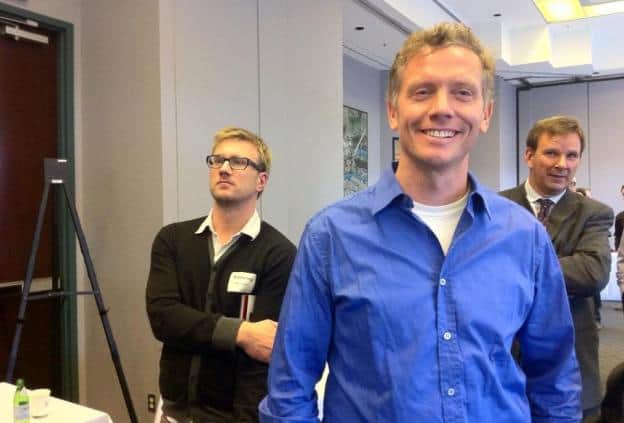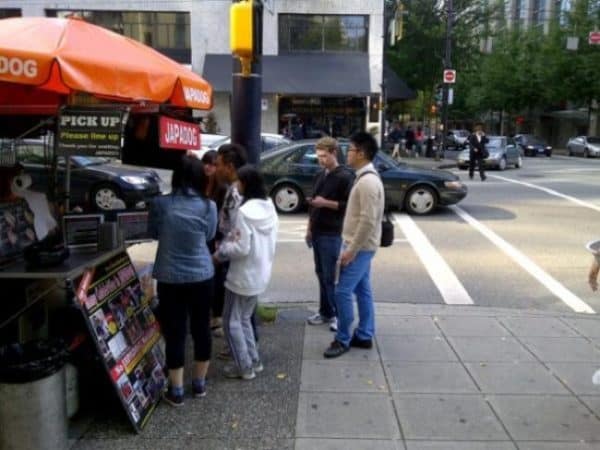
Ask the average Vancouverite to name the city’s biggest industry and you’ll get a variety of replies.
If you walk down Water Street from downtown, towards the rough hewn statue of Captain John “Gassy Jack” Deighton, you’ll be left with the impression that tourism rules the day here.
Vancouver has been referred to as the world’s most beautiful city on countless occasions, and people from all over flock to it, unnervingly persistent rain be damned. Of course, there might be a movie or TV shoot happening on Gastown’s cobbled streets, and that industry will pop up as an answer as well. Recent hit films such as The Twilight Saga, The Cabin in the Woods, X-Men and Fantastic Four were all filmed in the Vancouver area.
Another point of interest, the Gastown Steam Clock, is just steps from the water, and evidence of Canada’s largest port can be heard from there, even if those stepping out of Starbucks to see the rather mundane tourist attraction aren’t looking for it. Port Metro Vancouver trades $75-billion in goods each year and claims its “indirect and induced effect” is responsible for 129,500 jobs.
An answer you almost certainly wouldn’t have heard a decade is the technology sector. But that is changing, and the evidence is clustered mostly in loft style spaces with peek-a-boo views of Burrard Inlet, in Gastown.
Vancouver’s tech community has never had the marquee name that defines it and draws talent the way Research in Motion has in Waterloo or Nortel once did in Ottawa. As Capital West Partner’s Brent Holliday wrote three years ago in Cantech Letter, much of Vancouver’s early tech scene emerged from a BC Tel incubator called MPR Teltech, and from aerospace pioneer Macdonald Dettwiler. Engineers from Macdonald Dettwiler, which remains Vancouver’s largest tech by revenue, created MDI, which was acquired by Motorola. Then there’s Sierra Wireless, and Creo which sold to Kodak for more than a billion dollars. MPR Teltech spawned names such as PMC-Sierra and Abatis Systems.

There has been a smattering of other mid-tier names, but nothing so dominant as to define a sector. Ballard Power, for a time, looked like it would be important enough to establish a beachhead for the city in the cleantech space. In the mid-nineties, the promise of Ballard’s technology seemed both limitless and inevitable, and it was reflected in the company’s share price. In 1997, Ballard stock soared to $82, as the company received investments from DaimlerChrysler and Ford. Every major car company was developing fuel cell vehicles, from Honda’s FCX to GM’s Sequel.
But the inability of fuel cell developers to reduce costs, coupled with advances in battery technology began to sway momentum to electric vehicles. By 2005, shares of Ballard had fallen south of $4 and in 2007, it got out of the automotive market altogether. Ballard’s decline was supplanted tidily by the rise of Westport Innovations, which grew from a research project at the University of British Columbia to become the world’s foremost supplier of natural gas engines, forming partnerships with some of the world’s largest engine and vehicle manufacturers, such as Volvo, Kenworth, and Cummins, and attracting the interest of legendary investor George Soros.
The Ballard/Westport coupling sums up much of the history of the Vancouver tech scene; the city has been the very definition of Even Steven; lose a battle there, win one over here. The effect was a zero sum game in which tech remained firmly planted in the back seat, never calling shotgun, much less taking the wheel.
But lately, there is a different feel in Vancouver, one that has the city feeling more like an actual tech hub than it ever has before. The old mix of mining stock promoters taking liquid lunches at the Marble Arch and tattooed gym rats of dubious profession in Hummers is being replaced by skinny jeans and Macbook Pros. There are several new yoga spaces in the Gastown area. The vibe at the Charles Bar is decidedly different from the “Welfare Wednesday” dive bars that preceded it. At restaurants here you are as likely to encounter a Terrine of duck foie gras or Pan fried veal sweetbreads as you are a Subway sandwich. The rents, while still cheaper than tony Yaletown, are climbing.
What’s going on in Vancouver is mirroring what is happening in many other places, but on a larger scale than most. Unlike the dot-com days, when companies selling pet food online had mascots and multi-million dollar commercials, techs are cheaper to start and social media has meant that many are customer facing within weeks of inception. This means figuring out which shoestring startups have the potential to be the next Box or Twitter or Zynga is a less drawn out process, and potential financiers can concentrate on those that have passed at least the initial test of their mettle.

Richard Hungerford is the Head of Business Development for local startup Memelabs, a company that was originally built around a tool to manage user-generated content submissions for contests and promotions, but has evolved into a concern that enables brands and agencies to create and launch near-instant online promotions. He says the energy in the area is contagious.
“Beyond our walls, there are so many startups, design houses, and brilliant tech minds in this neighbourhood. Every time you grab a coffee it seems like the people at the table next to you are plotting the next Facebook or HootSuite!” he says.
Memelabs is part of Invoke media, which is overwhelmingly known as the company that spawned HootSuite, the social media player that has become synonymous with Vancouver’s tech ascendance. Casual observers probably first heard of HootSuite last year, when Facebook’s Mark Zuckerberg was spotted at a JapaDog stand in Vancouver. The rumour mill exploded, speculating that he was in town to buy HootSuite.

But HootSuite CEO Ryan Holmes quashed that notion, asserting that he was looking to “…build a billion-dollar company and take it to an IPO.” The social media platform now lists 79 of the Fortune 100 companies, including McDonalds, PepsiCO and FOX, as clients, and has more than five million users on six continents. Its users send more than three million messages through the dashboard each day, more than 1.2-billion since its launch. How important is HootSuite? Important enough that The City of Vancouver recently struck a sweetheart deal with the firm to supply office space that would keep it from having any thoughts of leaving.
“Vancouver’s tech scene is finally getting the international buzz it deserves,” says Holmes. He points to the news that the globally-recognized TED Conference selected Vancouver as their next host city for their 30th anniversary as just one recent piece of evidence.
“From our own HootSuite, to companies like Mobify, Vision Critical, Indochino, and Plenty of Fish, Vancouver has what it takes to foster the growth that international tech companies require. Among other things, this excitement has increased the availability of investment opportunities for tech startups in the city.” Holmes, along with Seattle angel investor Geoff Entress recently created Invoke Labs, which will be another source for funding and advice for startups.
HootSuite itself is one of three major investments made by OMERS Ventures in the Vancouver area, and together these companies, Vision Critical and BuildDirect being the other two, form a sort of Holy Trinity that local startups aspire to.
OMERS Ventures CEO John Ruffolo says what these companies share is the ability to scale globally. OMERS Ventures mandate, he says, is to find companies he feels can thrive not just in Canada, but on the world stage. He says the traditional wait-and-see attitude taken by Canadian venture capitalists in the past just doesn’t work these days.
“If you’re a Canadian VC, and Sequoia Capital is coming up to take a meeting with a company in your backyard” he told the audience of M Partners Tech12 conference in September, “maybe you should take that as a signal that you should too.”
While OMERS investment in HootSuite gets worldwide ink, one of its most interesting investments might be the lesser known BuildDirect. Unlike HootSuite, whose trajectory mirrors the proverbial PowerPoint hockey stick, BuildDirect’s path took thirteen years and the company was on the ropes more than once before becoming what some are now calling “the Amazon.com of building supplies”.
BuildDirect CEO Jeff Booth says the city’s tech scene has an energy he hasn’t seen before. “It feels like there are many companies just under the radar,” he told Cantech Letter recently.
“I believe it is easier to start today,” says Booth. “Vancouver traditionally had such a lack of early stage capital, so the companies that persevered became very strong. They had to make it without the access to capital that other regions had and to survive they had to become creative and resilient.” Booth says looking out on the Vancouver landscape he sees so many companies “that are great or have great potential”.

One person looking to make sure that today’s Vancouver startups have better access to capital is Mike Edwards. Edwards, who was recently voted 2012 BC Angel Investor of the Year, is the co-founder of accelerator GrowLab, which he was inspired to help create after noticing that Vancouver was lacking a world-class startup hub of its own. With dozens of startup investments behind him, including Punch’d, which sold to Google in July 2011, Edwards joined noted local angel investor Boris Wertz in founding GrowLabs.
Edward’s figure can often be seen late at night in the light of his third-floor office that looks out onto Hastings Street, near the pink glow of the locally famous Save On Meats neon pig. The 9000 square foot space is on the edge of Gastown in a place that is still regarded as a scrappy neighborhood, but it is fast transforming. Inside, coders hammer away at keyboards at desks they pay GrowLabs a small fee to occupy. There’s beer in the kitchen. There are dogs. Edwards, dressed in plaid shirt and khakis has the presence of a hip older brother in the mostly twenty-something environs, and it’s clear he would rather spend more time here and less time in the airports that his position demands.
Edwards offers that GrowLab, which shares space with the decidedly non-startup presence of Microsoft and Brent Holliday’s Garibaldi Capital, is tapping a vein of tech creativity many didn’t know existed in the city, and is already looking to deliver a second-wave of success to the scene.
“Companies like the BuildDirect and HootSuite inspire the teams to build faster, build better and aim higher,” he says. “We can create breakout technology companies in Vancouver and these companies help to pave a path to success.” He points out that the partner’s level of success affords the startups at GrowLabs not just money, but advice from entrepreneurs who have been there.
“Well, not here, exactly”, he mock-corrects himself. “This is something new for all of us.”
________________
Comment
Leave a Reply
You must be logged in to post a comment.



 Share
Share Tweet
Tweet Share
Share




Thanks for the great article on Vancouver’s tech sector. The city has been very supportive of our green tech company and groups like New Ventures BC and BCTIA have been great with practical advice. We’ve also benefited from some large federal
funding programs that helped with some initial injections of cash. We also love the perks of being in Gastown.
Thanks Aaron, I know you have been a big part of helping build the tech scene here…
Good article.
Great read. I’m proud that LemonStand is based out of Vancouver and I intend on staying here as we scale.